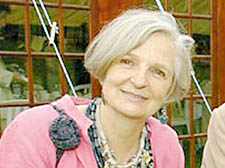| |

Writer Hilary Spurling is set to be one of the speakers at the University of the Third Age |
A Third way to approach education
A specialist university is proving a lifeline for older people
AT the University of the Third Age there are no exams and no certificates because members don’t need them – they are learning purely for pleasure.
Beginning with 100 members in a basement just off Gray’s Inn Road, 22 years later, it now has 165,000 students throughout the country.
Its students are all retired, but, as there is no lower age limit, those who have taken early retirement or been made redundant can join.
Based at Hampstead Town Hall, the London branch of the university offers a choice of around 20 classes a day, with a weekly total of 114.
A yearly fee of £55 (or £20 for those on income support) gets members into as many classes as they wish to attend – from politics, to American cinema, and Turkish to literature.
The organisation is entirely supported by member subscriptions, receiving no additional funding.
Classes are all taken by volunteer members with special expertise.
Marion Bieber, a founder member of the original group, and a current member of the executive committee, said: “It’s quite an amazing organisation. There’s hardly any absenteeism. People come rain or shine.
“If the Tube breaks down they still find a way to get here.
“Frail people in their 90s are still coming, with sticks, crutches or in wheelchairs.”
On Monday mornings talks held in the main hall draw capacity crowds to hear distinguished speakers discuss broadly ranging topics.
This autumn, film director Jack Gold, lawyer Baroness Helena Kennedy QC and biographer Hilary Spurling are all speaking.
New courses starting this year include Chinese, economics and policy and mythology.
Classes such as tai chi, yoga, tap dancing and folk dancing keep participants physically active too.
Ms Bieber added: “Our aim is to find and get together people interested in learning, who might otherwise be lonely, and keep them away from doctors’ surgeries.
“It is not just a school, it is what older people really need: a lifeline, mental stimulation and social support.” |
 |
| |
|
|


